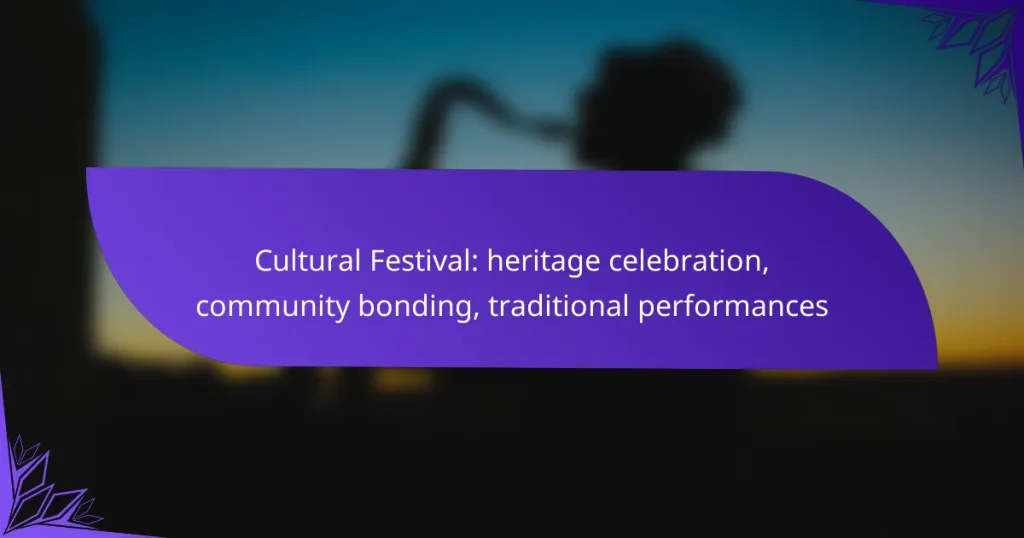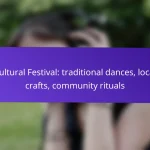Cultural festivals in the UK serve as vibrant celebrations of heritage, bringing communities together through shared experiences and traditional performances. These events not only showcase folk dances, live music, and storytelling but also foster a sense of belonging and unity among residents. By participating in these festivals, individuals can engage with their culture and strengthen community bonds in meaningful ways.
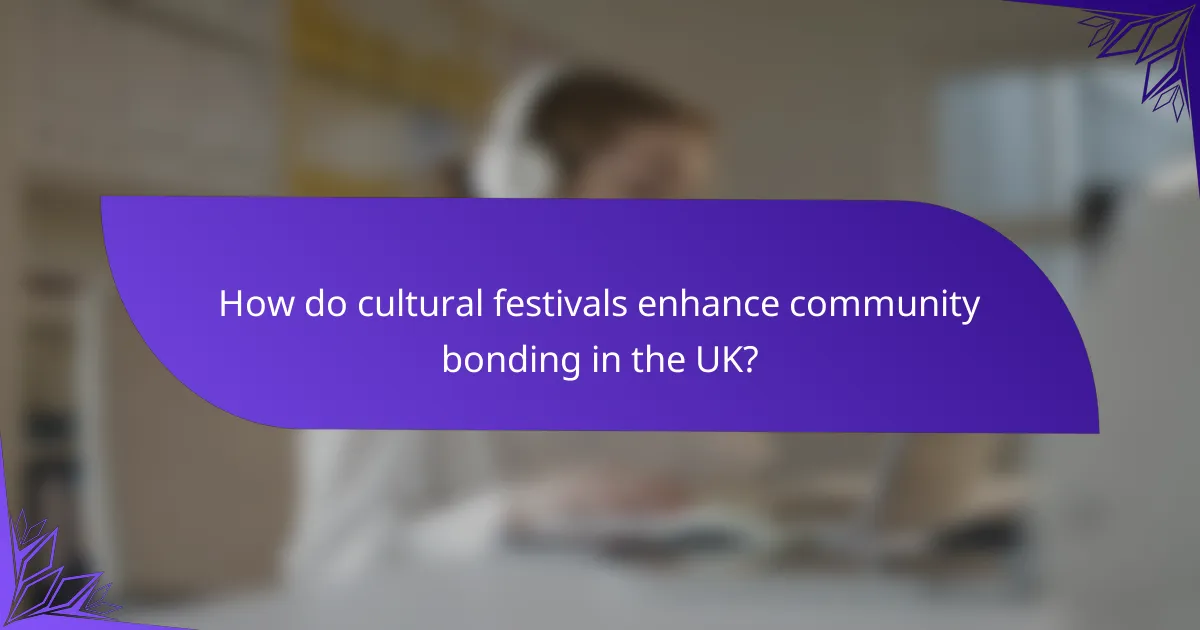
How do cultural festivals enhance community bonding in the UK?
Cultural festivals in the UK significantly enhance community bonding by providing a platform for shared experiences and collective celebration. These events foster connections among residents, encouraging a sense of belonging and unity through cultural expression and participation.
Strengthening local relationships
Cultural festivals serve as a gathering point for community members, allowing them to interact and build relationships. By participating in activities such as food stalls, craft markets, and local performances, residents can meet new people and strengthen existing friendships.
For example, a local music festival might bring together families, friends, and neighbors, creating opportunities for conversations and collaborations. This interaction fosters a supportive environment where community ties can flourish.
Encouraging cultural exchange
These festivals often showcase diverse cultural traditions, promoting understanding and appreciation among different groups. By featuring performances, art, and cuisine from various cultures, attendees can experience and learn about customs that may be different from their own.
In the UK, events like the Notting Hill Carnival highlight Caribbean culture, while other festivals may focus on Asian or European traditions. This cultural exchange enriches the community, encouraging inclusivity and respect for diversity.
Fostering volunteerism
Cultural festivals rely heavily on volunteers, which provides residents with a chance to contribute to their community. Volunteering for these events can enhance personal connections and instill a sense of pride in local culture.
Many festivals in the UK actively seek volunteers for various roles, from organizing logistics to assisting performers. This involvement not only strengthens community bonds but also empowers individuals to take an active role in shaping their cultural landscape.
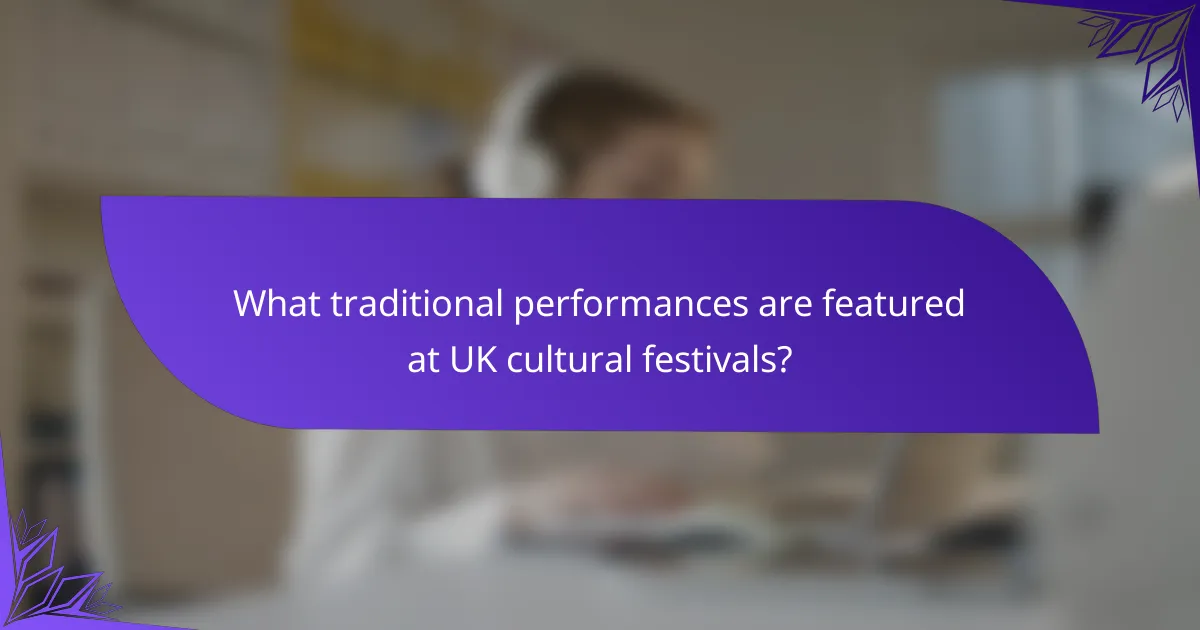
What traditional performances are featured at UK cultural festivals?
UK cultural festivals showcase a variety of traditional performances that highlight the rich heritage and community spirit. These performances often include folk dances, live music from local artists, and engaging theatre and storytelling, each contributing to a vibrant celebration of culture.
Folk dances
Folk dances are a staple at UK cultural festivals, reflecting the diverse regional traditions across the country. These dances often involve lively music and colorful costumes, encouraging audience participation and community bonding.
Common examples include Morris dancing, which features rhythmic stepping and the use of props like sticks or handkerchiefs, and ceilidh dancing, which involves group dances set to traditional Celtic music. Attendees can often join in, making it an interactive experience.
Live music from local artists
Live music from local artists is a key feature of cultural festivals, showcasing the talents of musicians who draw inspiration from their heritage. Genres can range from folk and traditional to contemporary interpretations of classic sounds.
Festivals may feature performances by bands, solo artists, and choirs, often incorporating traditional instruments such as fiddles, accordions, and bagpipes. This live music not only entertains but also fosters a sense of community and pride in local culture.
Theatre and storytelling
Theatre and storytelling are integral to UK cultural festivals, offering a platform for sharing historical narratives and folklore. These performances often include dramatizations of local legends, historical events, and traditional tales, engaging audiences of all ages.
Festivals may host performances by local theatre groups or storytellers who use expressive techniques to bring stories to life. This not only entertains but also preserves cultural heritage and encourages intergenerational connections within the community.
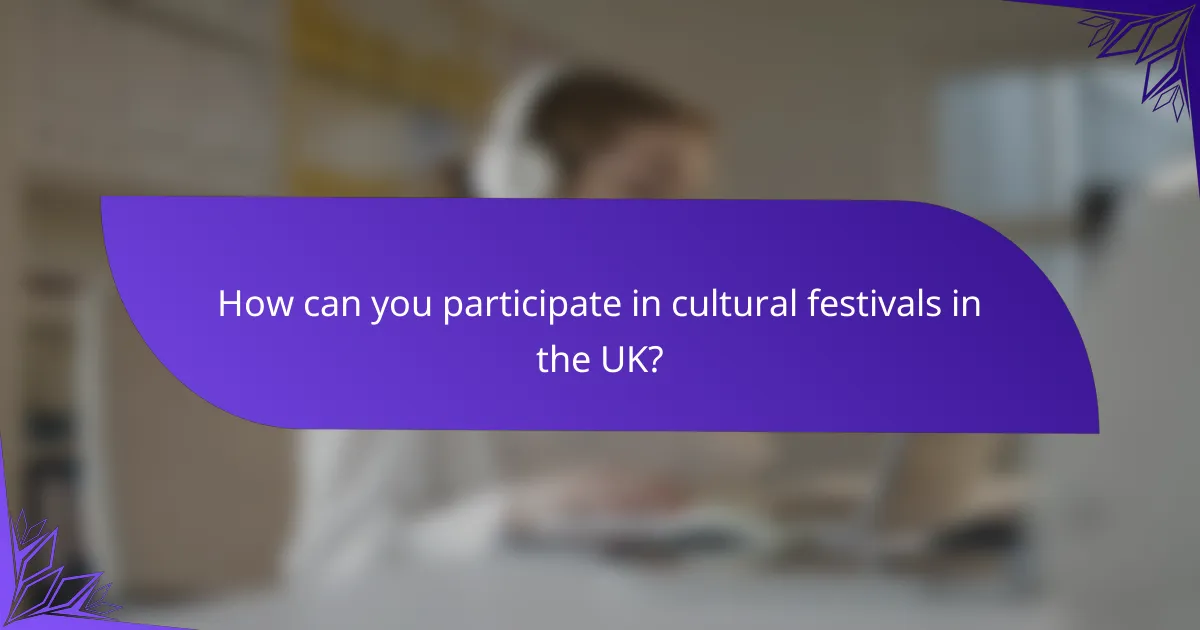
How can you participate in cultural festivals in the UK?
Participating in cultural festivals in the UK can be done in several ways, including attending as a visitor, volunteering, or performing. Each option offers a unique way to engage with the community and celebrate heritage.
Attending as a visitor
As a visitor, you can enjoy a variety of cultural festivals held throughout the UK, showcasing traditional performances, food, and crafts. Popular events like the Notting Hill Carnival or the Edinburgh Festival Fringe attract thousands, providing a rich experience of cultural diversity.
Tickets may range from free entry to modest fees, depending on the festival. It’s advisable to check the festival’s official website for schedules, ticketing options, and any specific entry requirements.
Volunteering opportunities
Volunteering at cultural festivals is a great way to contribute while gaining hands-on experience. Many festivals seek volunteers for roles such as event setup, visitor assistance, or managing activities.
Typically, volunteers receive benefits like free entry, meals, or merchandise. To find opportunities, visit festival websites or local community boards, and apply early as spots can fill quickly.
Participating as a performer
If you have a talent in music, dance, or theater, consider participating as a performer. Festivals often feature local artists and groups, providing a platform to showcase your skills.
To get involved, check the festival’s application process for performers, which may include auditions or submissions of your work. Being part of the lineup can enhance your visibility and connect you with other artists in the community.
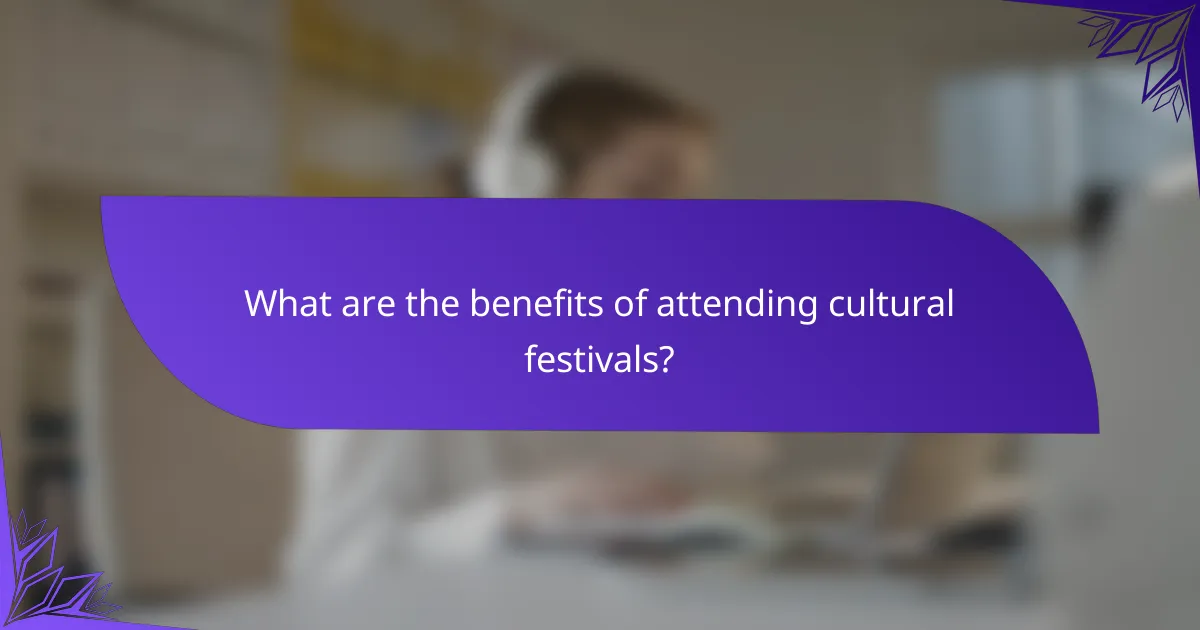
What are the benefits of attending cultural festivals?
Attending cultural festivals offers numerous benefits, including the opportunity to experience local heritage, support community businesses, and create networking opportunities. These events foster a sense of belonging and pride while showcasing traditional performances and customs.
Experiencing local heritage
Cultural festivals provide a unique chance to immerse yourself in the local heritage of a community. Participants can enjoy traditional performances, crafts, and culinary delights that reflect the history and customs of the area.
For example, a festival might feature folk dances, storytelling sessions, and local artisans demonstrating their crafts. Engaging with these activities helps preserve cultural traditions and promotes appreciation among attendees.
Supporting local businesses
These festivals often serve as a platform for local businesses to showcase their products and services. Attendees can purchase handmade goods, sample local cuisine, and discover unique offerings that may not be available elsewhere.
By supporting local vendors, festival-goers contribute to the community’s economy, helping small businesses thrive. This can lead to increased job opportunities and a stronger local economy, benefiting everyone involved.
Networking opportunities
Cultural festivals create an environment conducive to networking and building relationships. Attendees can meet like-minded individuals, artists, and community leaders, fostering connections that may lead to collaborations or new friendships.
To maximize networking potential, consider participating in workshops or discussion panels offered at the festival. Engaging actively with others can enhance your experience and open doors to future opportunities within the community.
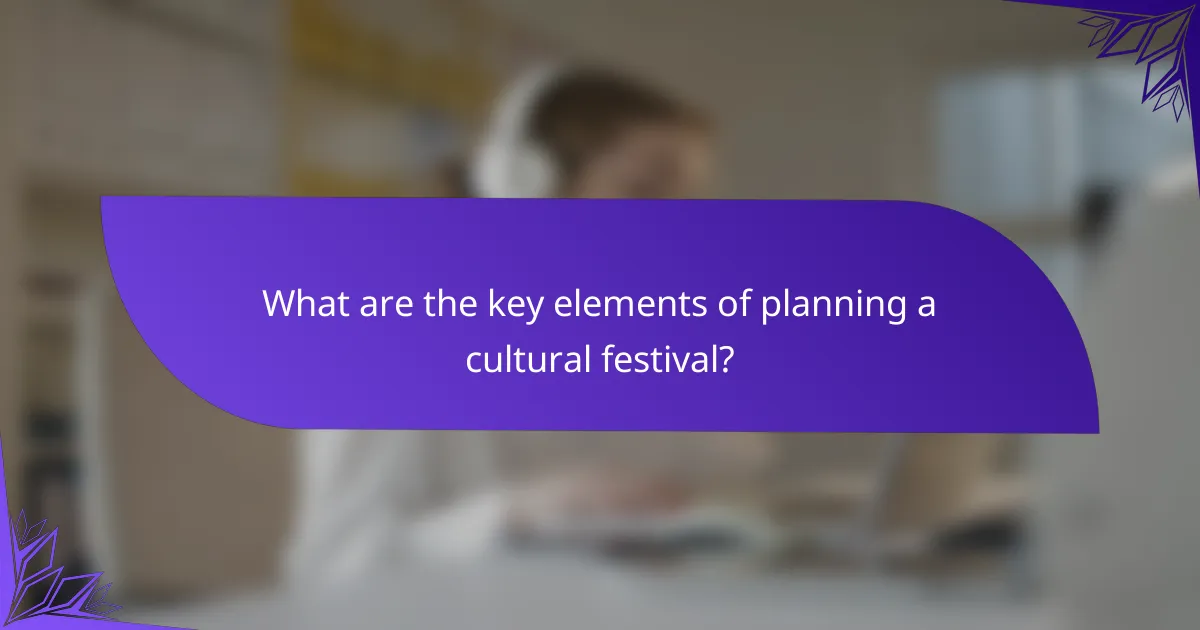
What are the key elements of planning a cultural festival?
Planning a cultural festival involves several key elements that ensure its success, including budgeting, venue selection, and effective marketing strategies. Each aspect plays a crucial role in creating an engaging experience that fosters community bonding and showcases traditional performances.
Budgeting and funding
Budgeting is essential for a cultural festival, as it determines the scope and scale of the event. Start by estimating costs for venue rental, permits, performers, equipment, and marketing. Consider seeking funding through local government grants, sponsorships from businesses, or crowdfunding campaigns to cover expenses.
When creating a budget, allocate funds for unexpected costs, typically around 10-15% of the total budget. This cushion can help manage any unforeseen expenses that may arise during the planning process.
Venue selection
Selecting the right venue is critical for a successful cultural festival. Consider factors such as accessibility, capacity, and amenities available at the location. Outdoor spaces like parks can enhance the festival atmosphere, while indoor venues may offer protection from weather conditions.
Evaluate potential venues based on their proximity to public transportation and parking availability. Ensure the venue aligns with the festival’s theme and can accommodate the expected number of attendees comfortably.
Marketing strategies
Effective marketing strategies are vital for attracting attendees to your cultural festival. Utilize social media platforms to create buzz and engage with the community, sharing updates and highlights leading up to the event. Collaborate with local influencers or community leaders to amplify your reach.
Consider a mix of traditional and digital marketing approaches, such as flyers, local radio ads, and email newsletters. Offering early bird tickets or group discounts can incentivize attendance and boost ticket sales.
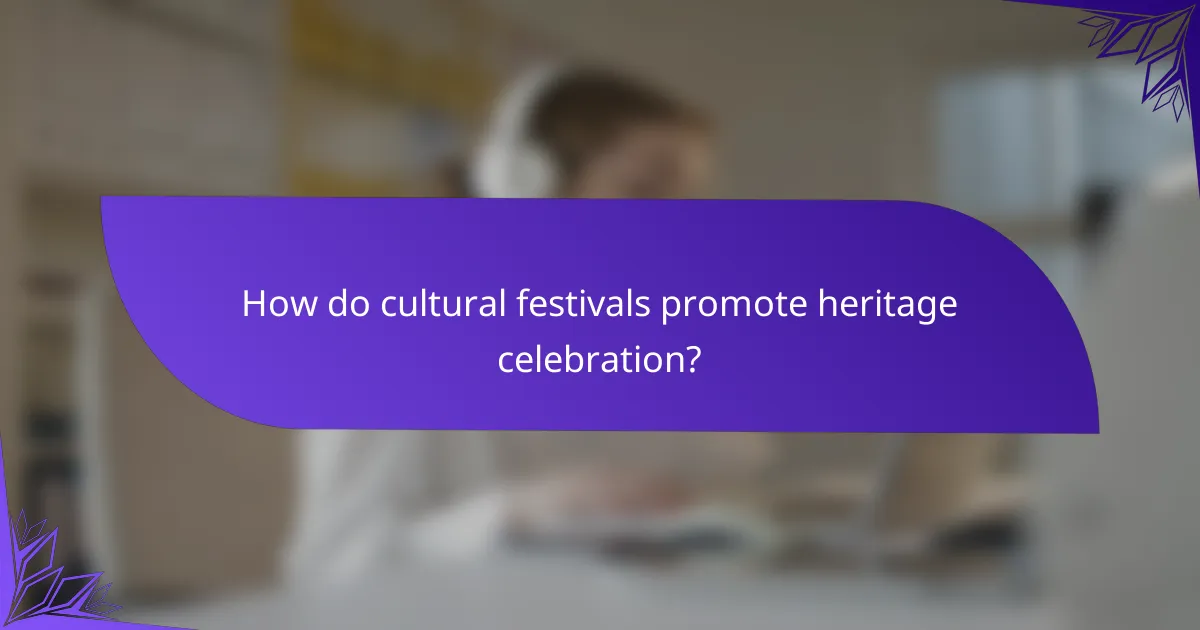
How do cultural festivals promote heritage celebration?
Cultural festivals promote heritage celebration by providing a platform for communities to showcase their traditions, crafts, and stories. These events foster a sense of belonging and pride, allowing participants to connect with their cultural roots and share them with others.
Showcasing traditional crafts
Traditional crafts are often at the heart of cultural festivals, where artisans display their skills and products. This not only preserves age-old techniques but also encourages local economies by attracting visitors who appreciate handmade goods. Examples include pottery, weaving, and woodworking, which reflect the unique heritage of the community.
Festivals may feature workshops where attendees can try their hand at these crafts, promoting hands-on learning and deeper appreciation. This interactive approach helps to engage younger generations and ensures that these skills are passed down.
Highlighting historical narratives
Cultural festivals highlight historical narratives by presenting stories that define a community’s identity. Through performances, storytelling sessions, and exhibitions, participants can learn about significant events, figures, and traditions that shaped their culture. This storytelling aspect creates a connection between the past and present.
For instance, reenactments of historical events or folk tales can vividly illustrate a community’s heritage. Such activities not only educate but also entertain, making history accessible and engaging for all ages.
Involving local historians
Involving local historians in cultural festivals enriches the experience by providing expert insights into the community’s heritage. These historians can lead discussions, give lectures, or participate in panels, sharing their knowledge and answering questions from attendees. This interaction fosters a deeper understanding of cultural significance.
Additionally, historians may collaborate with festival organizers to curate exhibits or create informative materials, ensuring that the narratives presented are accurate and meaningful. This partnership enhances the educational value of the festival and strengthens community ties through shared knowledge.
